- Home
- M G Vassanji
What You Are Page 5
What You Are Read online
Page 5
You’re so white; I mean—not pink.
Is that what you first noticed about me? Not pink?
No—that hair—no, before that—
Yes?
The car—it’s so majestic, the best car on the road.
You noticed the car first and not me?
But your hair—blazing, like a fire!
Flatterer. Yes, the brown head of curls, and the green eyes, how could you have missed them in the Citroën. My eyes are dimmer now, the hair is short and black; fashions change; and yes, dyed; and yes, thin too. You actually didn’t know where I came from. Sweden, you said once, and I pretended it was true; you didn’t know the flag on the car hood, the blue and white with the star in the middle that had been the badge of my people for so long, and how that endeared you to me. European, sure, but Romanian refugee, smuggled out through the border aged two.
I had not a friend in town, and this boy comes along; shy, serious, thoughtful. That’s the first thought that came to mind when I saw you—What is he thinking in that head? And he’s had his hair cut. It looks funny. And dark, he doesn’t care about the sun roasting him, turning him darker. His skin will wrinkle sooner, Mama might have said. I told her I had met this nice student from the boys’ school who had agreed to teach me Kiswahili, and after some discussion she and Papa agreed. You can bring him after school on Saturday…The first time you came to our house you fell from the rattan chair. I laughed, I cried—for you. Almost everybody fell from that ill-designed chair, how could you have known. I could have warned you but didn’t. Forgive a girl her whimsy.
You taught me calculus, my friend, I taught you Shakespeare; you did my physics for me, I gave you tennis…And when I said let’s sit out in the sun and came out in the balcony in my bathing suit, your brown face turned maroon.
I am sorry. But you did borrow my mother’s Lady Chatterley’s; just to find out what the fuss is about, you said. Sure. That too. I told her I had been reading it and a friend had borrowed it.
Certainly there was the exotic to you; the dark. And I was lonely. Not that there wasn’t other game in town. Little, but there. Hofner, also from Israel; the American twins who arranged a tryst under Selander Bridge to do the dirty on us diplomats’ daughters. But you were my special; your name I’d say over and over at night, happily; a king’s name; no, an imam’s, you insisted…precious music in my memory, Hoo…ssen, Hoo…ssen…until that scud-firing monster came along in Iraq and put his stamp on it.
The war came in Sixty-seven. And we were non grata, more or less, more because of my father’s job. He was a spy. African governments did not like us anymore. And you never saw that Citroën again. I disappeared. No goodbye, no notice. How rude, how heartless. But not heartless, please believe me. Simply, no choice. What’s the point, Mama said. You are going far away where he can never belong. And you are both young. Etcetera. What I might have told my own children later. And you yours.
It’s the drugs, you see, that have stirred you up like some genie. Yesterday I saw a boy blow himself up into shreds of bone and flesh and here I am. I am well, just shock, but it’s the drugs. The boy’s face. And this precious thought: I wish I could send it to you, this thought of love and friendship; this sorry apology. I wish I could write it before it disappears. Again.
Tova
Tel Aviv
* * *
—
“Will you sign the petition? This proposed boycott of Israeli investments—not that it will make any difference, but still.”
“Yes, if enough people sign it, it could make a dent.”
“There’s an article here says that an inordinate number of Jews make up the warmongering neocons. Does that make sense?”
“Well, if the Arab countries are crushed and pushed back ten years, that’s to Israel’s advantage…But I feel uncomfortable. There’s a difference between Jew and Israel.”
“I agree, but…”
“You know, all my professors—those I recall—were Jews? Let’s see—Julius Goldstein, Abe Klein, Ralph Amado, Jay Hirshfield…I looked up Hirshfield online recently, he’s still there. He and his wife invited me to their house for a barbecue one summer…I wonder if I should contact him. I didn’t even know then what a Jew was. Innocence lost.”
“Yes, innocence lost.”
It was a few days after the Munich massacre, the 1972 Olympics. Balmy July afternoon in New Haven, in the backyard. I recall her standing behind my chair, Mrs. Hirshfield, a bowl of salad or something in her hands. Friendly, curious, so informal. And so American. I was still new in the country, sitting with a few undergraduates, graduates, one postdoc and the prof. I had declined beer. Yes, I’d been watching the news, I told her, and how tragic it was, the senseless killing at the Olympics, what was the world coming to? What value to life?
* * *
—
“Do you recall the first time you fell in love?”
“I don’t know…I think so.”
“You never told me!”
“What difference does it make? You never told me about your past either. We met, and that was the beginning. Year Zero.”
“You don’t remember anything? I can tell you do.”
“There are some things we dare not touch.”
* * *
—
They are there, precious and delicate. I’m afraid if I touch them they’ll break and fall away, ashes. I want to preserve them. The beauty, the laughter. The ice-cold Coke your mother brought in glasses, such a delicacy and she knew how much I enjoyed it. And she brought us peanuts, shelled, and you Tova recited Romeo, Romeo…Tova. What a lovely name. Where would you be? I looked you up, many times, not to contact and harass you but just to see if you’re there, somewhere. Safe. Would you remember, in any case, the uncouth brown boy who fell off the rattan chair…yes you would. Then why disappear? I came to your flat, twice, knocked, until the neighbour said, They’ve gone away. In a taxi, to the airport. Hussein. Did you learn to hate that revered name later? Every time I read of a bloody incident over there, a rocket or bomb or something else, I cannot help seeing you.
Hussein
Markham, Ontario
* * *
—
My Friend.
Hussein, then. Why do I think of you? It’s the drugs. The shock. The wet spot on my cheek that I cannot forget. A tiny piece of the boy. I felt it then, its impact, but when I awoke it wasn’t there. Perhaps I imagine it. A piece of flesh. A drop of blood. I shudder…But why you? I’ve had lovers, two of them, real ones, and the marriage. They’ve all rushed to see me. Family and friends. Son and daughter. Former lover. But it’s you, falling off the rattan chair and I laughing my best laugh ever. Never like that again. How innocent we were. I want to cry. I cry. Do you ever think of me? Please think of me. Think of me. First love, no? First love, yes…
Mama’s smile when we came out of my room. The anxious look. Switching from one to the other, question on her face.
What does he say? I would like to hear what he says. You don’t have to keep him all to yourself, your door closed?
I don’t want you to listen when we talk.
All right. But—
She didn’t finish.
Why does she have such a tragic face? you asked.
Tragic? I laughed. But you were right, tragic indeed. Your face tightened, you made a claw, raised it to your face and brought it down. I knew what you meant, she had hollows on her face as though the flesh had sunk in some places.
Like someone died.
She lost her mother and father. And a brother. In the war.
The Second World War? But that was long ago.
You didn’t ask how they died, thankfully. Who wanted to go into that?
Do you want to kiss me? You never want to kiss me?
I leaned forward. All you could come up with was a
squeak: Kiss?
Here. I pointed. Slowly you kissed me on the proffered cheek. I offered my lips. I leaned further forward, looked into your eyes. After an infinity you touched yours to mine.
Enough, I said, as though you knew how to go further.
And later my mother at the door with that grief look. Like someone died. Sit down, she told you. Would you like another Coke? You glanced with horror at that chair and said, No, thank you…very much. And we laughed, Mama and I. Not at you. Yes at you. But not derisively, my friend. As though we ourselves spoke the Queen’s English. Just at how funny everything could be. You see, you made her laugh too. No small thing.
Your Tova
* * *
—
“Why that distracted look? You’re not paying attention.”
“What do you mean?”
“I just showed you the number of votes for the boycott, by country. France and Germany are the highest.”
“That may be time-dependent. It may change.”
“Still thinking about that first love?”
“What first love? Don’t be silly.”
Yes, I was. But why now, all of a sudden? What prompts a single memory of the past just to crop up?
“When we talk like that, it’s as if we don’t have a present.”
She smiles at that and goes away for her nap.
* * *
—
That kiss. It stayed with me for days. I could think of nothing else. What do you mean days, you’re thinking of it even now. How sweet it was. But what do I remember of its sweetness? It’s what I told myself, how beautifully sweet. I don’t want to eat or drink, so as not to lose that taste. So that’s what they do in the movies. But in the movies they linger. Is she making fun of me? What a nice girl, this Beautiful Name. That’s what I called you, Beautiful Name. Tova. Your other name, you said once, was Rosa Mihaela. But don’t ever call me that, you said. If you do, I will hit you. But why not, and why did you tell it to me in the first place? Your father swam across a river to escape Romania, you said. And you? You didn’t remember. I always imagined you on a red passport that said Rosa Mihaela.
Your father. Bald and dumpy, sitting in his chair quietly, beside a pile of newspapers. His head buried in one. You read the Hebrew ones for him. He didn’t know it, you did, because you took lessons, Thursday, from an old lady in town, before your judo lessons. Why judo? We laughed. You wouldn’t show me the moves, because you would have thrown me and you didn’t want to do that. One day you gave me a copy of Doctor Zhivago to read, your silent father’s suggestion. And another time James Baldwin’s Another Country. And they both told you to go with me to see Shakespeare at the Odeon. I was embarrassed, insisted we get down from the Citroën a block away and walk to the cinema, you ahead. You went inside first, then I followed. To be seen with a girl, and a white girl at that! I would have been teased no end. I didn’t understand the films, recall Brando giving a speech and Olivier jumping about. Didn’t even know these actors by name. Just those two movies and then I found excuses not to go. The second time, before I came to join you inside, someone else had slipped in beside you, and made lewd comments throughout, you said, and you would never forgive me. I didn’t either. Still don’t, for my cowardice. But they would have said I was chasing you because you were white, and they would have called you names. Free. Easy.
Sorry, Beautiful Name. Where would you be now, doing what? Did you join the army, with your judo? Did you kill anyone? Google doesn’t know you—Tova Jacob? No Rosa Mihaela either. Do you only exist in my imagination? They say memories can be manufactured…A golden-haired Israeli girl in a blue Citroën on United Nations Road. No. I kissed her, ever so lightly, the taste so sweet, so sweet. And then…
Hussein
* * *
—
“That suicide bomber,” he says, and she looks up.
“Yes, what?”
“How many died?”
“Three people were killed and the young bomber.”
“What a waste.”
“A lot more were killed by the Israeli planes. An entire family.”
His heart sinks. What a world we came out into. What have we become.
* * *
—
Hussein.
My heart is weak, they say. That’s why they’re watching me. The shock of the explosion. The sight of blood. But it’s my gut that’s torn, I tell them, it’s the gut that burns even if I wasn’t hit, I was too far away to be hit. I only saw. The boy blew himself up. We’ve repaired it, they say. Your gut. And with the medication the pain will go away.
They’ve repaired it. Medication.
But you won’t go away. Like a djinn you’ve sprung up. Why is it, after so long, my mind latches only onto you? Okay, the kids and grandkids, they are there, but then it’s you. I asked to look into my old album with these poor eyes, but I could not find you. Not a trace. Did Mama remove you? Someone else? Myself? The only proof from that time, something I could touch, thrown away into rubbish. Vanished. I cried. It’s only this memory now that is my album…that plays like a movie and I don’t know if it’s old or new.
The sight of the pretty nurse brought rude thoughts into my mind just a moment ago. I imagined her love life. Why are you smiling? she asked. I imagined you in a bikini, I said. You don’t object? No, of course not. Sometimes I like to come out in a bikini.
When I came out in the swimsuit, not a bikini, just to shock, you stared but didn’t stare. Looked away carrying that image. Red with blue and white stripes diagonally across. Red, your face. Red, mine.
You can look. It’s a swimsuit.
I know.
Look, it’s okay.
He turns. And stares. Up and down. Breathless. I sit down, stretch my legs towards him.
Well?
Nice. You look nice.
You want to touch? He’s helpless. Anywhere. Touch me anywhere.
Anywhere. He reaches out a trembling hand, his finger goes up and down the cleft.
You can kiss me on these lips, I say.
Your Tova
* * *
—
Where would you be now, Tova? Would you remember, in any case, the uncouth brown boy who fell off the rattan chair…yes you would. Of course you would. We made something out of nothing. You started it.
Perhaps you joined the army and were killed, I thought. And I thought perhaps you went to live in a kibbutz. No, not her, I said. Maybe you moved to New York and are right now not far away at all. Two people connected by thought. Memory. Can thoughts find each other, grope and play and caress, over a distance? Like two magnetic fields? Give pleasure in some abstract space? But what would you remember? Perhaps I’ve imagined that kiss. Memories change, they say. No, and there was the second kiss…The even more deadly one.
Hussein
* * *
—
I saw your home, my friend, which you didn’t want me to see. Let’s pass his home, I said to Abdu. I don’t know it, he said. Find it, I told him angrily. He smiled. The next day sure enough we drove by your house, a row house, actually, in a square block. There was a yard in front, two papaya trees. The door was open but it was too dark inside to see. A woman went in with a boy. I knew you gave lessons, it must be your pupil with his mama.
I felt I violated you, by peeping into what you did not want me to see. I did not want to tell you I had seen your home, you would have stopped coming to mine, and I would have lost you…Did we do wrong? When I said, My turn to touch, and held your hardness and you wet your pants instantly, in a flood. And the smell. You left quickly, holding a magazine in front of you and I rushed to the bathroom and smelt my hand. I licked it.
And then we left. Twenty-four-hour notice, Papa said. And I forgot. Of course I forgot. Please remember me, Hussein, wherever you are. Clever boy, he will go away, Mama
said. Remember me, bring me back, remember me…
Tova
* * *
—
Dear Professor Hirshfield,
You may not remember me, but I spent a summer in your lab when I was an undergraduate. It was 1972, and I worked on feedback stabilization of plasmas. I found you on Google and thought I’d send you my greetings. That was a most enjoyable summer for me. And very instructive. Please give my regards to your wife. And my thanks for having welcomed me.
Sincerely,
Hussein Nanji
* * *
—
“I had a most disturbing dream.”
“Yes? What was it—do you remember?”
“Yes, clearly this time. It’s really depressed me. We were in some country travelling in a tourist bus, and we were stopped at a border area. The police singled out you and me, took us to two different buildings. I don’t know why they singled us out. There was a guy with a moustache in charge. They took me to a room and waterboarded me, and while they were doing that, this guy with the moustache took out his belt, tucked in the buckle, and was ready to whip me, and I kept protesting, But why? And I realized there was no sound from your end. I was scared. At that time two helicopters descended outside, some men in uniform came and took away the guy with the moustache. You see, I had given my phone to a person in the bus, and he must have called Toronto. You were okay.”
“That’s a frightening dream. I heard you shout a couple of times in your sleep.”
“When I woke up, I thought, how little we know of what people go through in other parts of the world. How much they suffer. We read about it, but we don’t really know. We can’t know, sheltered as we are, covered in a blanket. That’s what I thought…and still think. How sheltered we are. How little we know.”
“Isn’t it good to be sheltered? To have been saved?”

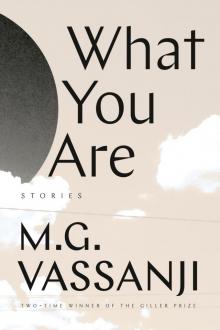 What You Are
What You Are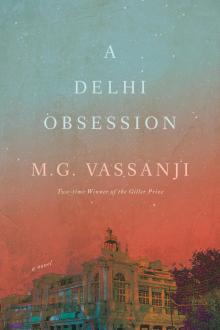 A Delhi Obsession
A Delhi Obsession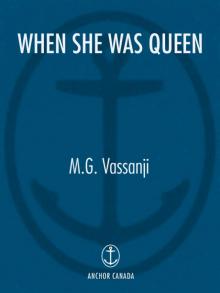 When She Was Queen
When She Was Queen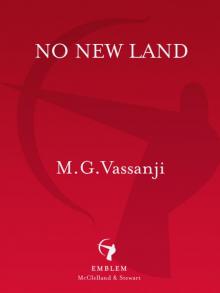 No New Land
No New Land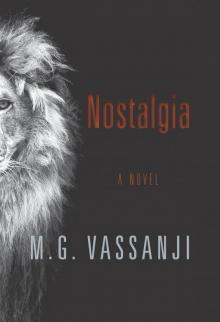 Nostalgia
Nostalgia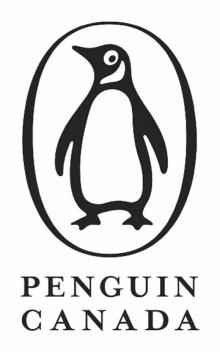 Mordecai Richler
Mordecai Richler The Book of Secrets
The Book of Secrets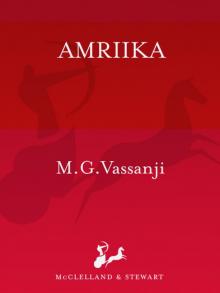 Amriika
Amriika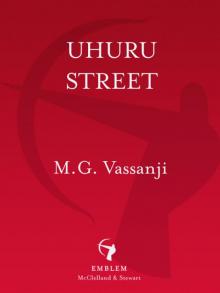 Uhuru Street
Uhuru Street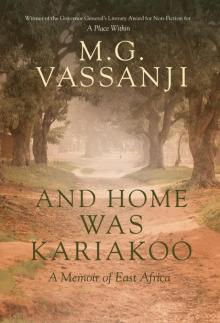 And Home Was Kariakoo
And Home Was Kariakoo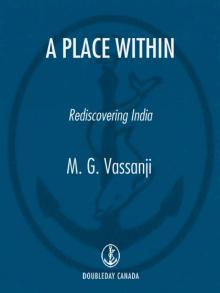 A Place Within
A Place Within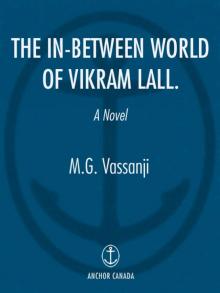 The In-Between World of Vikram Lall
The In-Between World of Vikram Lall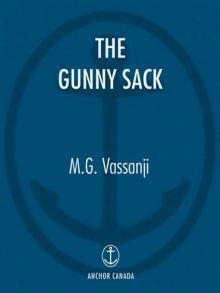 The Gunny Sack
The Gunny Sack